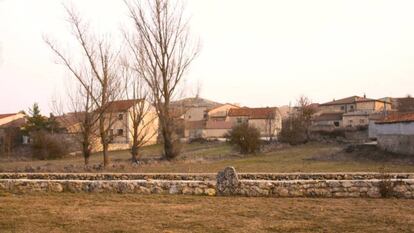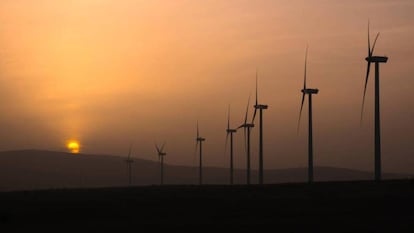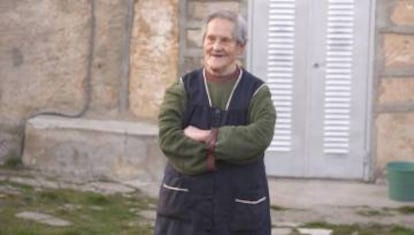Why does this Spanish village rank third for cleanest air in the world?
Campisábalos, in Guadalajara province, has little more than 60 residents, a few houses, and lots of wind
“Today is a bad day: the wind is blowing in from the south,” says Pedro José María de Pablo, the mayor of Campisábalos, standing next to an air quality monitoring station. In this small village in Spain’s Guadalajara province, the wind generally blows from the northwest without crossing any major industrial zones.

This fact, coupled with a reduced population of just 68 souls – 20 in winter – and its location 1,300 meters above sea level, makes Campisábalos the municipality with the most pristine air in all of Spain, and the world’s third cleanest, according to the World Health Organization (WHO).
The village is located in the northwestern portion of the province. Getting there requires driving down several secondary roads. The mayor explains how the people’s character has been shaped by geography.
My grandmother died at the age of 94; my aunt at 96, and my mother at 94
Carmen García, born in Campisábalos
“The weather plays a big role, the cold makes us hard workers,” he notes. “Many of us moved to Madrid, where nearly all of us have been successful.”
In a nearby field, cows graze with the same sort of calm that emanates from the landscape, where the only thing that breaks the skyline is a group of 50 or so wind turbines.

The few people who still live here work mainly as farmers and livestock breeders. There are hardly any cars, and the only vehicle in sight is a tractor passing by the front of the church. The noise of the engine blends in with the drip of the public fountain and the sound of the church bells that ring out at 6pm.
Pedro José María de Pablo is a retired physicist who used to work as a public employee at the Environment Ministry, then ran for mayor with the conservative Popular Party (PP). He has been at the helm of the local council for three terms.
Air pollution occurs when there is a concentration of particulate matter, much of it created by humans. The WHO recommends that particles of the type PM2,5 (fine particulate matter) should not be in excess of 10 micrograms per cubic metre (μg/m3) as an annual average, and those of the type PM10 (larger matter) should not exceed 20 μg/m3.
In the entire world, only Muonio in Finland and Norman Wells in Canada enjoy cleaner air than Campsábalos
The Campisábalos monitoring station, located on a hilltop 800 meters from the village, shows measurements of 5 and 6 μg/m3, respectively.
It’s not just that there’s no particulate matter in Campisábalos. There’s nothing, period. The only presence on the streets, which are lined with stone houses, is the wind and the odd dog. No businesses, no stores – just a local nature center that doubles as a bar.
In the entire world, only Muonio in Finland and Norman Wells in Canada enjoy even cleaner air than this hamlet located 160km from Madrid. At the other end of the spectrum, the city of Onitsha, in southeast Nigeria, has pollution that is 30 times the recommended WHO levels.
In November of last year, the European Environment Agency noted that pollution causes around 30,000 premature deaths in Spain and 520,000 across the EU. And Brussels has just issued an ultimatum to several member states, including Spain, telling them to improve their air quality.

Some people who were born in Campisábalos note that their relatives typically lived to ripe old ages. “My grandmother died at the age of 94; my aunt at 96, and my mother at 94. And the mayor’s mother is over 100 years old,” says Carmen García, a Madrid resident who was born in the village.
Her husband, David Álvarez, was born in Ponferrada (León), but he often goes to Campisábalos with his wife.
“I have a bronchial disease, and when I’m in Madrid I need to take medication,” he explains. “But I don’t need it here, I feel really good.”
English version by Susana Urra.
Tu suscripción se está usando en otro dispositivo
¿Quieres añadir otro usuario a tu suscripción?
Si continúas leyendo en este dispositivo, no se podrá leer en el otro.
FlechaTu suscripción se está usando en otro dispositivo y solo puedes acceder a EL PAÍS desde un dispositivo a la vez.
Si quieres compartir tu cuenta, cambia tu suscripción a la modalidad Premium, así podrás añadir otro usuario. Cada uno accederá con su propia cuenta de email, lo que os permitirá personalizar vuestra experiencia en EL PAÍS.
¿Tienes una suscripción de empresa? Accede aquí para contratar más cuentas.
En el caso de no saber quién está usando tu cuenta, te recomendamos cambiar tu contraseña aquí.
Si decides continuar compartiendo tu cuenta, este mensaje se mostrará en tu dispositivo y en el de la otra persona que está usando tu cuenta de forma indefinida, afectando a tu experiencia de lectura. Puedes consultar aquí los términos y condiciones de la suscripción digital.








































